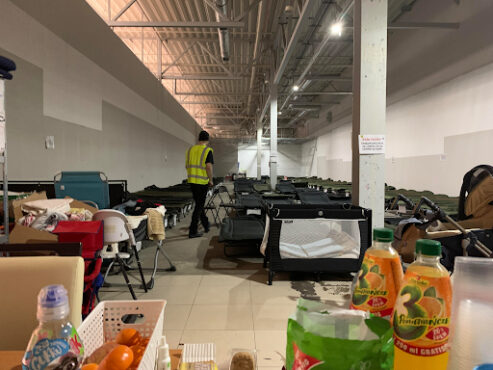Sienna Wishewan has spent over a month volunteering at the Przemyśl Humanitarian Aid Centre

Przemyśl Humanitarian Aid Centre’s mom and baby room. Photo by Sienna Wishewan.
Grey and green cots line the walls of the Przemyśl Humanitarian Aid Centre’s mom and baby room. The exposed beams and fluorescent lights overhead give the space an industrial feel. One corner has been turned into a play area with toys and stuffed animals neatly placed along wooden shelves. Children’s art hangs on a wall. One drawing features a blue and yellow Ukrainian flag and a peace sign. Near the entrance, shelves lined with baby food hint at the building’s past as a Tesco grocery store. In front of the shelves sits a desk piled with supplies. It’s where UVic student Sienna Wishewan spent much of her time as a volunteer.
Over the past five months, Wishewan has spent a month and a half volunteering at the aid centre located near the Polish-Ukrainian border. The fourth year political science and global development student first travelled to Poland with her father on March 14, shortly after the invasion of Ukraine.
“It was extremely overwhelming as somebody who was coming to help,” said Wishewan about her first arrival at the border. “I can’t imagine how much more overwhelming it was for people fleeing.”
In May, Wishewan, who is Ukrainian-Canadian, returned to the border alone for a month to continue volunteering at the centre. While there, she continued to work in the mom and baby room, helping out wherever she could and working 12-hour days.
Wishewan woke up at 7:00 each morning to make the 40-minute walk to the Przemyśl Humanitarian Aid Centre. On her way, she would stop for supplies like baby food and diapers before walking the rest of the way with as many bags as she could carry.
At the centre, Wishewan would eat breakfast before starting her shift where she helped out with everything from cleaning to looking after kids until her shift ended at 9:00 p.m. Though the centre was modest, without even running water, the room provided a safe and private space for moms who needed help with childcare or a place to breastfeed.
“They were basically coming in with their clothes [and] not even a baby bottle,” said Wishewan about the mothers she met at the centre.“There is so much uncertainty. They don’t want to stay here for too long. They don’t know where they’re going. They don’t know what to do.”
Though uncertainty was a common feeling among those at the centre, Wishewan said every person she met was in a different situation, and some of their stories will always stay with her.
One of these is the story of a boy around 15 years old who arrived at the centre with his mother and aunt after fleeing an area actively occupied by Russia.
The family, like many, was met with a series of Russian checkpoints that make it difficult and dangerous to travel, let alone leave the country. Wishewan believes the boy was questioned especially hard and checked for gun powder to ensure he had no connection to or intention of joining the Ukrainian army.
“People at these Russian checkpoints, they just get shot point blank for no reason. [They] get arrested, and there’s no justice,” she said.
This family, however, made it through 15 Russian checkpoints.
“It gives me goosebumps when I think about it,” Wishewan said. She recalls thinking, “something big must be planned for you to have made it through 15 [checkpoints] and be standing here in front of us.”
Other experiences, however, left Wishewan feeling less hopeful. She still thinks about one mother who arrived at the centre with a young daughter, only to refuse help.
“She was so scared that she walked out with the clothes on her back and her two-year-old daughter,” said Wishewan. Although the woman left behind everything including her documents and phone, Wishewan says she never saw her return.
Despite the long hours and the devastation she witnessed while volunteering at the centre, Wishewan misses it every day that she’s in Canada and already knows that she’ll return.
“You hear so many awful things, and you see so many hard situations when you’re there,” said Wishewan. “[But] being there [and] being able to support makes all the difference for me.”
While she described feeling helpless since returning to Victoria, Wishewan hasn’t stopped doing what she can to continue supporting Ukrainian refugees, and she’ll soon be welcoming a family of five into her home.
“I only have two bedrooms, so it’s going to be a bit squishy with the six of us and my dog,” Wishewan laughed but added that she is happy to sponsor them so they can stay together.
When she met the family at the centre, they were struggling to find a sponsor who was willing to take in all five of them and, if not for Wishewan, they were likely going to be separated in Canada.
The family submitted their visa applications on May 18, however they have yet to be approved. Wishewan has no idea when to expect them and is struggling to coordinate their temporary housing in Poland and flights to Canada.
Though Wishewan is currently busy supporting her sponsor family through the immigration process and preparing for their arrival, she is already thinking about returning to Ukraine in the future.
“There’s no keeping me from going back,” Wishewan said. “I’ve always loved that country and I love it even more for how strong it is.”
Five months after Russia first invaded Ukraine, Wishewan sees the world’s attention beginning to waver but urges people not to turn away.
“The support can’t end … It’s still such an active and devastating presence in our lives, so we need that support and attention to continue.”







